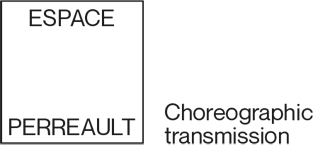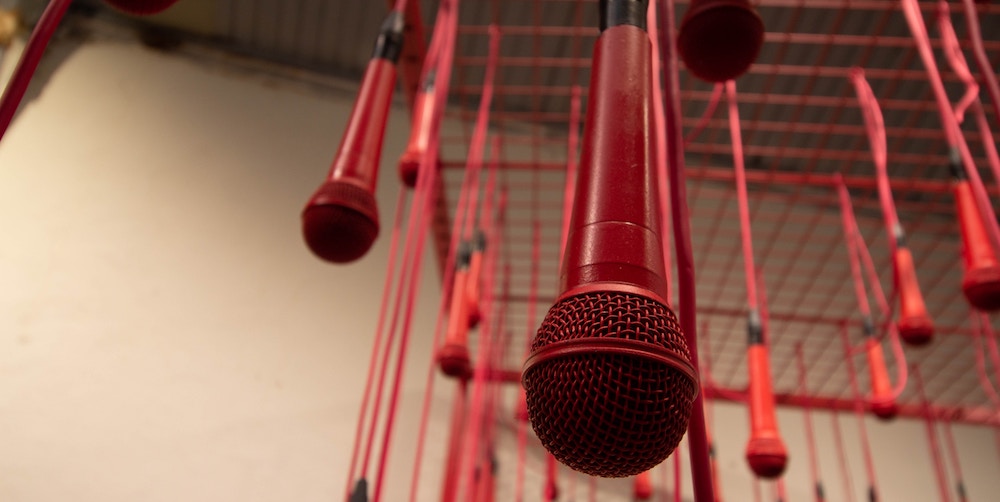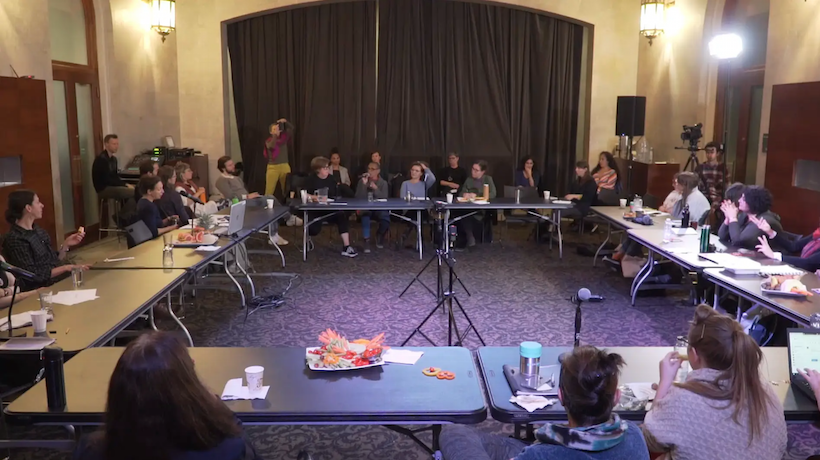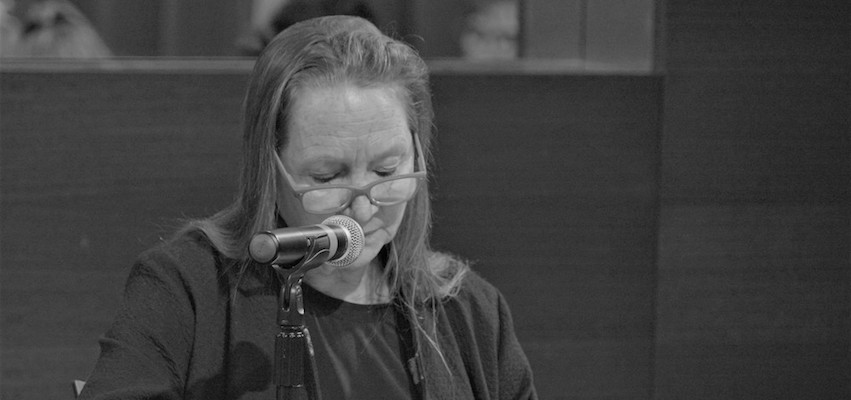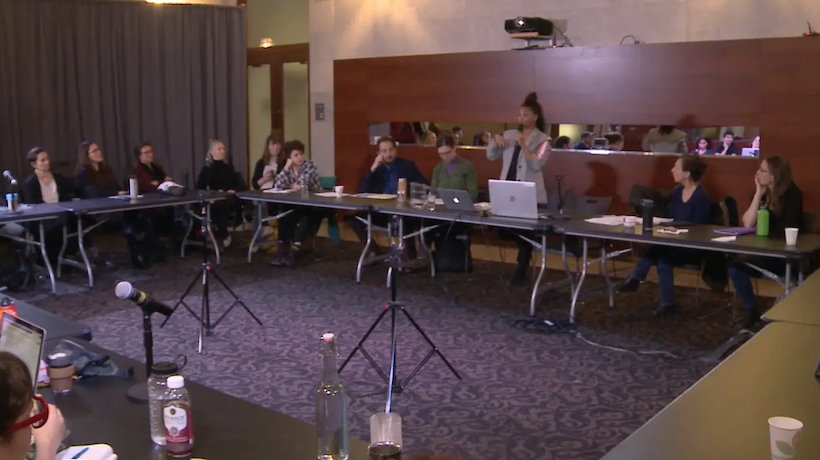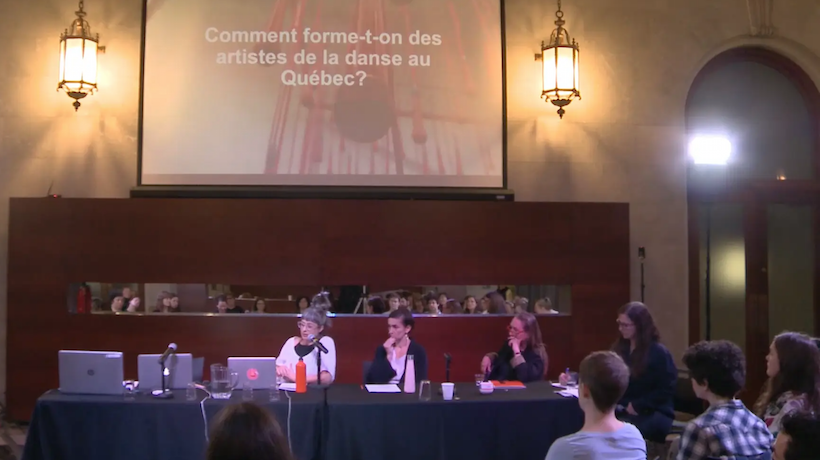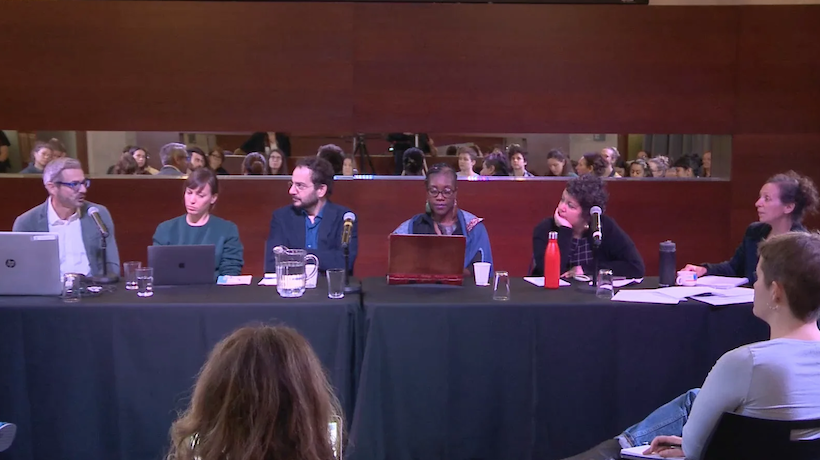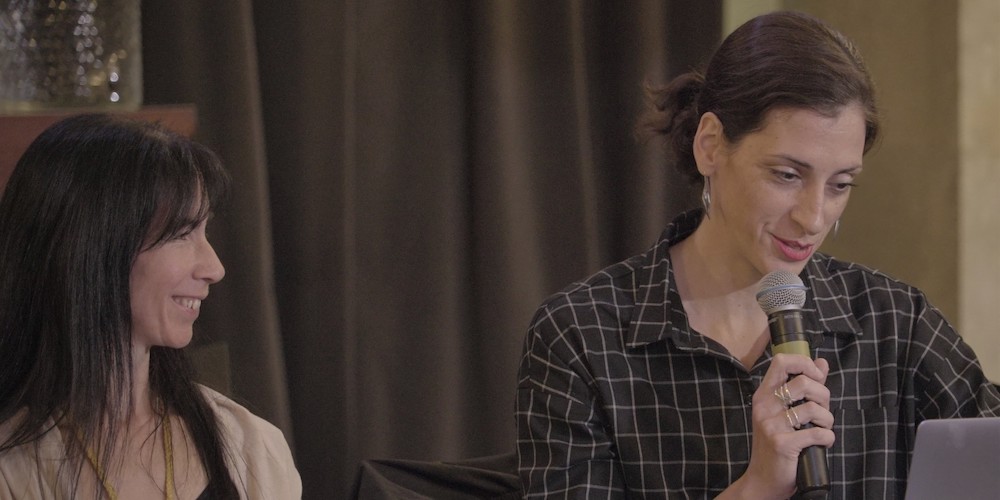Event program
We’ve decided to switch up the usual hierarchical format for this type of event, with the speakers on stage and the audience in the room. Instead, we’ll be opting for a more participatory setup in order to elicit multiple viewpoints on the notion of authorship.
In the afternoon, we’ll hold a large round table discussion where participants can take turns weighing in, much like an animated banquet where each guest is invited to speak. We strongly encourage the audience to take part in the discussions so that all participants will essentially co-author the event.
IN THE MORNING: AUTHORSHIP IN DANCE / A MULTI-FACETED NOTION
How has the dance milieu structured itself and what roles and authority are given to its different actors? Multiple perspectives on authorship in various cultures.
- 10 a.m. – Opening: word of welcome
- 10:10 a.m. – Round table discussion: Multiple ways of looking at authorship in dance
- Georges Azzaria, legal expert and director of the École d’art at Université Laval: The legal notion of authorship in the performing arts
- Rhodnie Désir, choreographer, artistic director, executive producer of the BOW’T TRAIL project: Authorship in dance and the BOW’T TRAIL project
- Hervé Guay, professor of theatre studies at UQTR: Constant changes in authorial configurations in the performing arts and non-inclusion in programs
- Catherine Lavoie-Marcus, choreographer and researcher: Who does this ballet belong to? Authorship in dance according to the law: The Cosmopolitana case (1862)
- Nayla Naoufal, critic and researcher: About Gift of Stone, the first long work by Sámi Norwegian choreographer Katarina Skår Lisa, which disrupts the notion of authorship
- Led by: Lise Gagnon, executive director of the FJPP
-
- 11:35 a.m. – Round table discussion: How do we train dance artists in Quebec?This discussion will focus on the training of dancers and choreographers, how they choose their identity and how their respective roles are valued.
- Johanna Bienaise, professor in the Department of Dance at UQAM
- Lucie Boissinot, director of the École de danse contemporaine de Montréal (EDCM)
- Silvy Panet-Raymond, professor and director of the Department of Contemporary Dance at Concordia
- Jamie Wright, dance educator
- Led by: Hélène Duval, professor in the Department of Dance at UQAM
IN THE AFTERNOON: AUTHORSHIP IN DANCE / MULTIPLE EXPERIENCES
A number of guests interested in questions related to authorship in dance will share their thoughts and experiences.
- 1:45 p.m. – Mélanie Demers, author of Danse Mutante, will briefly present this project and the issues it raised around the notion of authorship.
- 2 p.m. – Collaborations, co-creation: What do contracts and notions of authorship establish?
- Mélanie Demers, choreographer for Danse Mutante
- Katya Montaignac, choreographer, dramaturg and artistic director for collaborative projects by La 2e Porte à Gauche
- Led by: Georges Azzaria, legal expert and director of the École d’art at Université Laval
- 2:45 p.m. – Involvement of dancers in the creation of works: a look at co-creation. What do dancers think?
- Francis Ducharme, dancer in Danse Mutante and actor
- Marie Claire Forté, dancer and choreographer
- Barbara Kaneratonni Diabo, dancer and choreographer
- Led by: Anne Thériault, dancer and choreographer
- 4:15 p.m. – The dramaturg’s role and perspectives on the work’s author
- Sophie Michaud, artistic consultant and rehearsal director
- Katya Montaignac, choreographer and dramaturg
- Angélique Willkie, professor in the Department of Contemporary Dance at Concordia, dramaturg for Danse Mutante
- Led by: Danièle Desnoyers, choreographer, professor and director of the Department of Dance at UQAM
- 5 p.m. – The notion of authorship in dance: How can we name and define it?
- A look back on the day and open discussion
- 5:30 p.m. – Cocktail
Authorship in dance: Multiple experiences
Friday, October 18, 2019
Conseil des arts de Montréal – Atrium
1210 rue Sherbrooke Est, Montréal
Entrance fee : 5$
RSVP by October 14, 2019
Biographies of speakers
Georges Azzaria
Professor of Law at Laval University from 2001 to 2017, his research focused on the relationship between art and copyright, the socio-economic status of artists, digital technologies and legal methodology. Since 2017, Georges Azzaria is the director of the School of Art of Laval University.
Rhodnie Désir
As a Choreographer, Artistic Director, Cultural businesswoman and charismatic Orator, Rhodnie Désir is a contemporary voice grounded in her Central and West African ancestry and Afro-descendant heritage. She vibrantly articulates the expressions of the people she meets in her nine choreographic works ( RD Créations) and more than 2,200 cultural activities for youth (via the Dêzam company). These creations draw on a socially engaged and politically sophisticated perspective that weaves lively connections between collective memories of the past and our experiences of the present. In 2016, Désir’s flagship work Bow’t (Canada, United States, Burkina Faso) led to the pioneering international documentary/choreographic project titled Bow’t Trail (Radio-Canada/ARTV), which she toured to Martinique, Haiti, Brasil, Mexico, Canada and United States. This project was the only one from North America invited to participate in the Francophone cultural programming at the 2016 Olympic Games in Brazil. In 2016, she was awarded a Grand Prix Lys de la Diversité du Québec; she is currently president of MAI (Montréal, arts interculturels), is a frequent speaker (e.g., at colleges and universities in Quebec and at UNESCO events), and is also a cultural commentator.
Hervé Guay
Hervé Guay is a full-professor in the Department of Letters and Social Communication at the Université du Québec à Trois-Rivières. His research interests include Quebec cultural history, discourses on theatre, performance aesthetics, digital in the living arts and spectating. President of the Société Québécoise d’études théâtrales from 2011 to 2015, he founded the Laboratoire de recherche sur les publics de la culture and codirects the journal Tangence and the Centre de recherche interuniversitaire sur la littérature et la culture québécoises.
Catherine Lavoie-Marcus
Catherine Lavoie-Marcus is an interdisciplinary artist based in Montreal. Since 2009, she has presented choreographic creations and research in Quebec and abroad. She publishes zines and theoretical reflections in the form of articles and essays, and writes a free-writing column for the magazine esse arts + opinions. Catherine holds a PhD in art studies and practices from the Université du Québec à Montréal. She is currently a research associate at the Amsterdam School for Cultural Analysis (ASCA).
Nayla Naoufal
Born in Beirut, Nayla Naoufal works as a dance journalist, a researcher in environmental humanities and a cultural worker. She writes for Le Devoir and Esse. She is an associate member of the Research in Center Environmental and Ecocitizenship Education at UQAM. Nayla is particularly interested in the rights of nature and environmental justice, and is closely following the work of choreographers drawing on indigenous epistemologies, or concerned with decoloniality or ecological issues. Her presentation is based on a long-term collaboration and dialogue with the Norwegian Sami choreographer Katarina Skår Lisa, which she started during her recent two-and-a-half-year stay in Norway.
Johanna Bienaise
Johanna Bienaise has been a professor in the Dance at Department at UQAM since 2012 and has been responsible for the GRIAV (an Interdiscipinary Research Group in Live Arts) since 2015. Holder of a doctorate degree in the Study and Practice of Art at UQAM, Bienaise’s research has centered around questions concerning methods of Interpretation, Training in Contemporary Dance and research-creation methodologies.
Lucie Boissinot
Lucie Boissinot œuvre dans le milieu de la danse contemporaine depuis quelque 40 ans. Interprète recherchée et chorégraphe émouvante, elle a collaboré à la création d’un grand nombre de projets chorégraphiques canadiens. Chemin faisant, elle a débuté sa carrière d’enseignante à l’âge de 25 ans. Elle agit à titre de directrice artistique et des études de l’École de danse contemporaine de Montréal, depuis 2005. En 1985, elle se mérite le Prix Jacqueline-Lemieux du Conseil des arts du Canada. Elle a joué un rôle actif au sein du Conseil des arts de la ville de Montréal de 2006 à 2012 et siégé au Conseil d’administration du Regroupement québécois de la danse de 2012 à 2016.
Silvy Panet-Raymond
Interdisciplinary artist working in dance, video, performance, writing and hybrid forms. Cofounder of Tangente, and of Art-Adventure, for international site specific projects. She is currently Chair of the Department of Contemporary Dance, Faculty of Fine Arts, Concordia University where she teaches choreography and creative process.
Jamie Wright
Jamie received her Bachelor’s Degree in Dance in 1997 at York University. As a dancer, she created and toured four different works with Compagnie Flak/José Navas between 2002 and 2008, and went on to collaborate with artists such as Ginette Laurin, Estelle Clareton, Dana Gingras and Caroline Gravel, amongst others. Since 2007, she has been creating, performing and rehearsal directing in close collaboration with Frédérick Gravel. Jamie teaches regular professional classes and has been on the teaching staff at EDCM since 2006. Her interest lies in making class content relevant to the current modes of research and creation. She is currently co-president of the board of directors of the Regroupement québécois de la danse (2017-present).
Hélène Duval
Hélène Duval, PhD, is a professor at the UQAM Dance department since 2005, teaching in the bachelor and master’s programmes. She is a researcher associated with the Centre de recherche interuniversitaire sur la formation et la profession enseignante (CRIPFE) and a member of the Chair for the development of innovative practices in arts, culture and well-being. She mobilizes the concepts of professional identity, reflexivity, creation and inclusive pedagogy in the activities of research and formation. Presently she is involved in three funded (FRQS-CRSH) studies concerned with artistic education, notably on dance as a means of educational and social inclusion.
Mélanie Demers
A multiplatform artist, Mélanie Demers combines dance, theater and visual arts. After 10 years as a performer with O Vertigo, she founded the company MAYDAY in 2007 and explores the powerful link between poetics and politics. It is in this perspective that she builds her work, from the play Les Angles Morts to Danse Mutante and Animal Triste. For WOULD, Mélanie Demers receives the prestigious CALQ Prize for the best choreographic work as part of the 2015 Montreal Dance Awards. To date, the choreographer has presented her works in some fourty cities in Europe, America, Africa and Asia.
Katya Montaignac
Choreographer, dance dramaturg and curator, Katya Montaignac creates “unidentified dancing objects” especially with La 2e Porte à Gauche. She collaborates as dramaturge with different choreographers (Frédérick Gravel, Marie Béland, Milan Gervais, Nicolas Cantin, Karine Ledoyen…). She completed the doctoral program in the study and practice of the arts at UQAM, teaches dance aesthetics, and writes for various journals. She was dance curator for 7 years at the offta Festival. She wrote a book about Josephine Baker and contributed to books on the company Danse-Cité and about FTA. She created with Sophie Corriveau the event (Not) All of us are Dancers.
Francis Ducharme
Francis Ducharme graduated from the theater option at Collège Lionel-Groulx in Sainte-Thérèse. He began a career on three fronts: theater, film and dance. Since his graduation, he has acted in some twenty theatrical productions. An iconoclastic artist, he has been seen in the works of Quebec choreographer Dave St-Pierre. He has worked for the Belgian choreographer Sidi Larbi Cherkaoui and Damien Jalet. He also dances for the Grouped’ArtGravel directed by Frédérick Gravel, for Mélanie Demers and Clara Furey. He has also collaborated with choreographer Catherine Gaudet.
Marie Claire Forté
Marie Claire Forté is driven by the relational, experiential and experimental potential of dance. As a choreographer and dancer, she leads her own projects and is currently working with Louise Bédard, Aurélie Pédron and Martin Bélanger. She was dancer in residence at l’Agora de la danse from 2017 to 2019. In 2016, she and her friend Sophie Bélair Clément created the exhibition project and publication – I’d rather something ambiguous. Mais précis à la fois. at the Leonard & Bina Ellen Gallery. She danced for four seasons at the now-defunct Le Groupe Dance Lab in Ottawa, training daily with Peter Boneham. Alongside and through her artistic practice, she translates, writes and teaches dance.
Barbara Kaneratonni Diabo
Barbara Kaneratonni Diabo originally comes from the Mohawk Nation of Kahnawake and is now living in Montreal. A professional dancer and choreographer in many styles for over 25 years, she presently specializes in both traditional and contemporary Indigenous dance, especially in the hoop dance. She takes great pride in regularly sharing her culture and has performed across Canada and internationally. She has taught all ages, from babies to elders, through dance, music, storytelling, and interactive workshops. Her goal is to inspire others, encourage cultural pride, uplift the spirit, and increase education and communication.
Anne Thériault
Anne Thériault is a choreographer and performer. She has collaborated with a number of artists across various artistic disciplines since 2008, including Martin Messier (Derrière le rideau, il fait peut-être nuit et Con grazia), Julie Favreau (Doux), Lynda Gaudreau (Out of Grace), BOP, Karina Champoux, Frédéric Tavernini and Dave St-Pierre (Quatuor pour la fin du temps), Frédérick Gravel, Simon-Xavier Lefebvre, Dana Michel, and Dave St-Pierre and Louis Bouvier (POP project). Her works have been presented at several festivals in Québec and abroad, notably the Festival TransAmériques, OFFTA, the Akousma and Actoral festivals. She has distinguished herself as a performer in the past 10 years, performing works by choreographers including Nicolas Cantin, Dave St-Pierre, Marie Béland and Danièle Desnoyers. In 2013 she experimented by pairing dance with theatre in Ainsi parlait… (Thus spoke…) by Frédérick Gravel and Étienne Lepage, and La Fureur de ce que je pense by Marie Brassard. She has been invited to serve as curator for the first edition of Visite Libre, organized by LA SERRE – arts vivants in 2017.
Sophie Michaud
Sophie M. is specialized in accompanying the creative process in contemporary dance. For thirty years, she has been evolving both with emerging creators and with established artists as assistant choreographer, director of rehearsals and dramaturgy consultant. As a researcher, she is interested in the phenomenon of perception in the dance viewer and by the communication issues occurring between artistic collaborators. In parallel to her work in the studio, she develops workshops for the Regroupement québécois de la danse (RQD) and works as an artistic mediator in various contexts.
Angélique Willkie
Performer, singer, pedagogue and dramaturg, Angélique Willkie pursued a career in Europe over 25 years where she worked with, among others, Alain Platel, Sidi Larbi Cherkaoui, Jan Lauwers / Needcompany, and as a singer with the Belgian world-music group, Zap Mama. A dramaturg for dance and circus productions, and still on stage as a performer, Angélique is Assistant Professor in the Department of Contemporary Dance at Montreal’s Concordia University and is currently pursuing a PhD at the Université du Québec à Montréal (UQAM). Her research reflects her interest in dramaturgical practices and, most particularly, in the dramaturgy of the performing body.
Danièle Desnoyers
A major figure in Quebec dance, Danièle Desnoyers founded Le Carré des Lombes in 1989. Since then she has created more than twenty striking pieces which have been produced in Canada, the United States, Europe and Asia. Her repertoire (Discordantia, Concerto grosso pour corps et surface métallique, Duos pour corps et instruments, Là où je vis, Dévorer le ciel, Paradoxe Mélodie, Unfold|7 perspectives, etc.) is testimony to her vision based on the interdisciplinary resonances between movement, the plurality of music and the visual arts. The choreographer has also created a dozen works on commission for Canadian and foreign companies. With Le Carré des Lombes, she has been welcomed at multiple residencies, both in Quebec and abroad, and has been supported by several coproducers. An engaged artist and educator, Desnoyers is now Director of the Department of Dance at the Université du Québec à Montréal, where she received most of her professional training.
